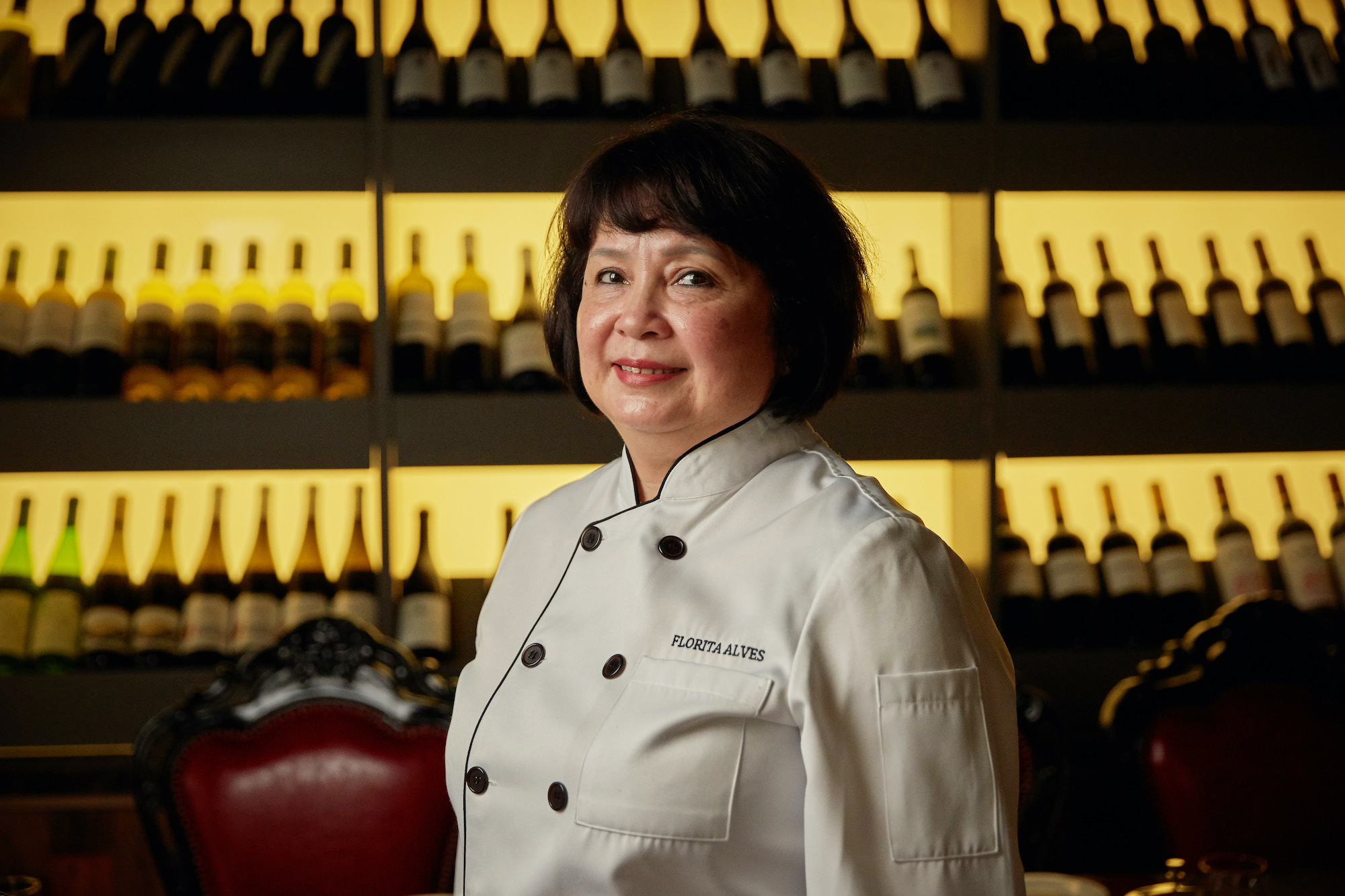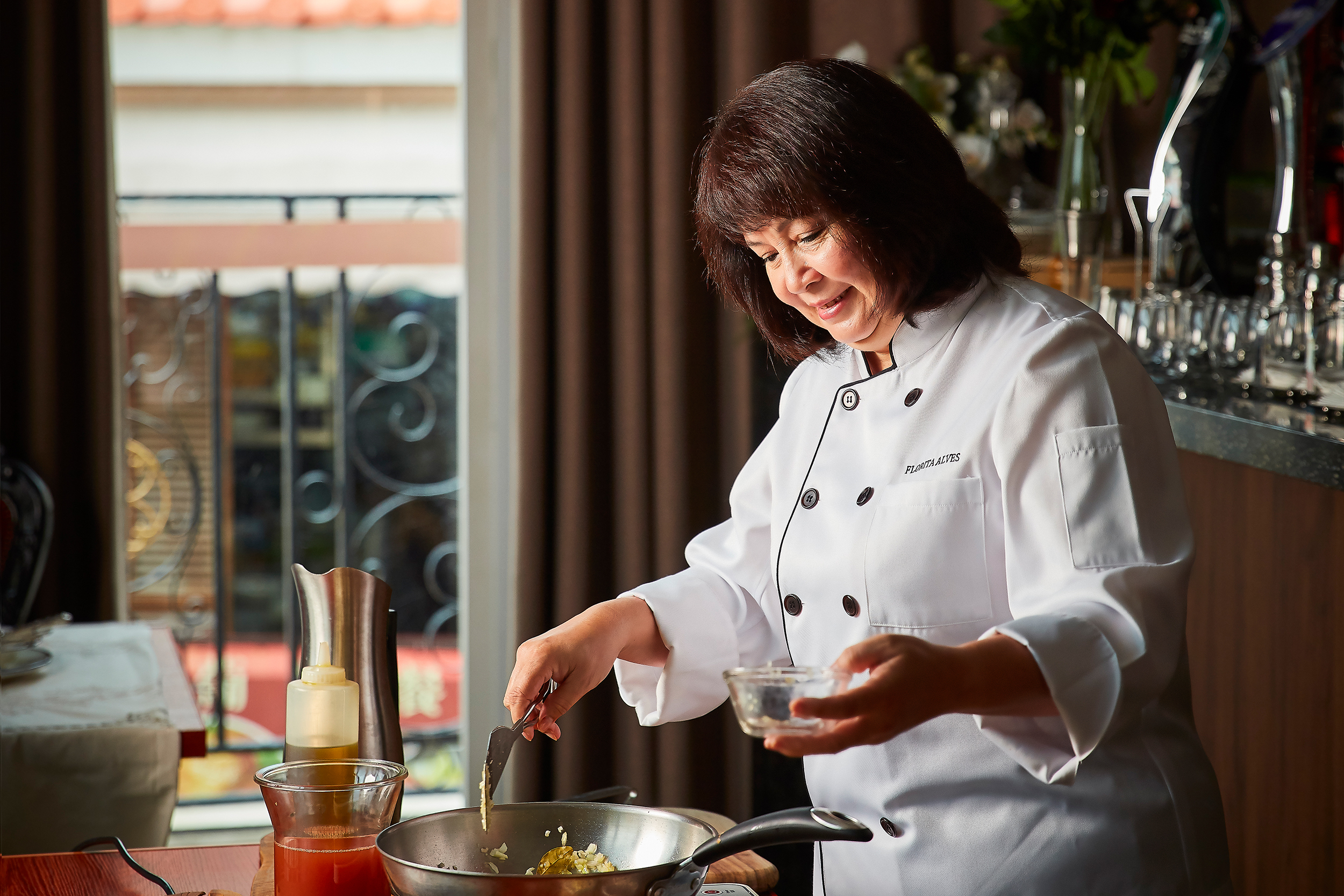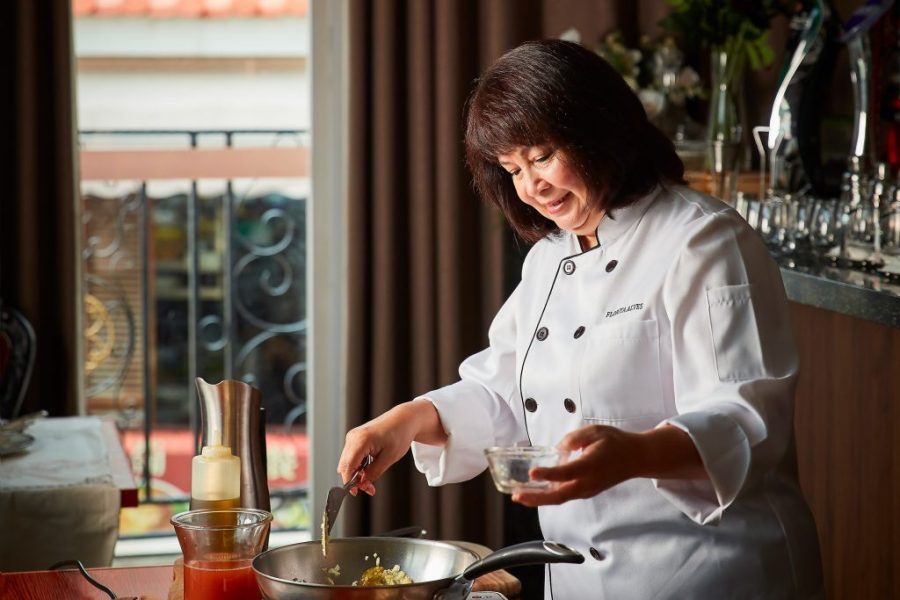For more than a decade, Florita Morais Alves has championed Macanese flavours both locally and globally. She transports the tastes, sights and smells of Macanese food from home kitchens to the tables at her restaurant La Famiglia. Alves also hosts cooking demonstrations, both online as well as at international gastronomy events.
Born in December 1960, to a Macanese father and a Chinese mother, the retired civil servant is proud of and deeply connected to her Macanese, Portuguese and Chinese heritage through the food she cooks.
The birth of a second calling
Alves didn’t begin her professional career in food and hospitality. In fact, she first spent over 30 years as a civil servant. At the age of 18, she got her first job as assistant postmaster at the Macao Post Office. The following year, she began dating her Macanese husband, who worked nearby.
“In the old days, there wasn’t much entertainment. Our dating life was quite domestic. During lunch breaks or after work, I cooked for him.” And thus, out of food, grew love. After three years at the Post Office, she transferred to the Insurance Supervision department at the Issuing Institute of Macao, now the Monetary Authority of Macao, where she remained for 31 years.
Following a life-long career as a dedicated civil servant, Alves decided she wanted to contribute back to society by promoting Macanese food. “To be honest, as a retired civil servant, I don’t have to work anymore, but I had an incredibly happy life, and I wanted to give back to this town. And for me, the way was through the food of Macao that is so uniquely positioned at a crossroad of history and cultures.”
Her opportunity came in 2010, just a year after her retirement. NHK TV from Japan was filming a series of gastronomy programmes and was looking for someone to demonstrate Macanese cuisine. The Macao Government Tourism Office contacted the Macanese Gastronomy Society (Confraria da Gastronomia Macaense), which in turn invited Alves, who by then had already carved out a name for herself as an expert in local fare.
She recalls making casquinha de caranguejo (stuffed crab shells): “I chose this dish because it was special to my family, and it demonstrates the global fusion element of Macanese food, using local ingredients with Western techniques.”
The broadcasted demonstration flung open the doors for Alves, who was then invited to collaborate with bloggers, local hotels, and the Macao Institute for Tourism Studies (IFT). Shortly thereafter, in 2012, Macanese gastronomy was inscribed on Macao’s List of Intangible Cultural Heritage.
In 2017, Alves’s son Vinicio teamed up with some friends and opened La Famiglia, an Italian restaurant located in Taipa village. Due to the density of Italian restaurant offerings, La Famiglia pivoted to Macanese cuisine in 2018, changing its Chinese name from ‘The Home of Italy’ to ‘The Home of Macanese Flavours’.
Alves became chef de cuisine of La Famiglia, and with her team of five, the restaurant has seen business take off, especially with Hong Kong customers. “Many middle-aged Hong Kong tourists come in search of sentimental dishes that they ate in Macao in the 1970s,” she explains.
In 2018, Alves was awarded “Best European Chef” by CEUCO (European Council of Enogastronomic Brotherhoods) in Athens, Greece. Most recently, La Famiglia has been chosen as an ‘Essence of Asia 2021’ restaurant, deeming it one of the top 50 Asian restaurants celebrating regional and local fare. “We feel proud to earn such recognition,” says Alves. “It really encourages us to keep exploring the history and dishes of our regional cuisine.”
Food, family and love, intertwined

Alves first began cooking at the age of seven, under the tutelage of her Chinese grandmother, who cooked both Chinese and Portuguese dishes. She viscerally recalls the aromatic smells of her grandmother’s kitchen: onions, garlic and shallots, staples in Portuguese dishes, and spring onions and ginger for Cantonese steamed fish.
“In those years, Portuguese home cooking was simple – Bacalhau (salted cod fish), poached food, steaks and pork chops. Not very exciting. However, we marinated the pork chops in a Western way, with salt, pepper and garlic, and rounded off the dish with a starchy sauce.”
And in fact, Alves’s earliest sous chef duties included making this starchy sauce of cornstarch, sugar and soy. It is a ubiquitous sauce served with Portuguese dishes, as a finishing sauce to many Cantonese dishes, and often served over rice. The first savoury dish she remembers cooking is minchi (Macanese sautéed minced beef and/or pork), a simple and delicious traditional dish.
She fondly remembers accompanying her grandmother on shopping trips to the market Mercado Municipal Horta da Mitra: “At that time, fishmongers didn’t sell fish on the stands that you see now; they sat on small stools with their fish on a board placed on the floor, aside a thick cutting block.
I remember an old lady selling fish at an entrance of the market. She must have sat there filleting fish every day for hours on end. I liked watching her handle all kinds of fish, and I marvelled at such hard work day in and day out.”
Alves looks back on the old market days of no air-conditioning and slippery floors, with nostalgia: it was a time of greater environmental conscientiousness, where food was wrapped in newspaper and bundled with rope made of woven straw.
Shoppers put their items into rattan baskets and purchased only what they immediately needed due to limitations of storage. “Summer holiday was three months long. People went food shopping every day, even twice a day, because we didn’t have good fridges.”
Alves never grew up distinguishing the foods she ate as specifically Chinese, Portuguese or Macanese. To her, they were simply dishes that she ate everyday, a veritable melting pot as a result of Macao’s unique cultural and ethnic history.
When she married in 1984, at the age of 23, her in-laws opened her eyes to a deeper understanding of Macanese food. “My mother-in-law knows many people who excel in cooking and baking. They used to arrange gatherings where they served chá gordo, and this is how I came to understand the variety of Macanese food.” Chá gordo translates literally into ‘fat tea’, a traditional Macanese afternoon tea served with a spread of delicacies.
Christmas Eve 1984, just three months after getting married, Alves faced the first challenge that would test her culinary knowledge. Asked to host a ceia (late supper) for her in-laws, following midnight mass, she threw together a meal featuring empada de peixe procured at the old Mercearia Hap Heng, which still used a firewood oven.
Translated as ‘tortoise bun’ (麵龜) in Cantonese, empada de peixe is a Macanese fish pie flavoured with olives and turmeric, with a buttery sweet and savoury crust. She also prepared some stir-fried noodles, deep-fried snacks and Macanese Christmas delicacies – alua (butter cake), cakes and pinwheel pastry – for her in-laws and their relatives, some of whom had just returned to Macao after many years in Portugal. “I wanted to make them the local foods that they must have missed.”
It is a universal truth that breaking bread brings people together and transcends our differences. Alves is grateful for all the people who have inspired her gastronomic experiences and adventures. In particular, she attributes her husband’s childhood nanny Fun Che with helping to form so much of her culinary knowledge and interest.
Che excelled at making a wide range of Chinese cakes, including nin gou (a sticky rice flour cake served at Chinese New Year) and sugar rings. “People in the old days possessed excellent craftsmanship with their hands.
When [Fun Che] made sugar rings, she attentively rolled dough into long, thin pieces and wove them into one single ring. Nowadays, people tend to use moulds. I feel so lucky to have met people who passed down their knowledge and love of food. Food makers back then were extremely skilled and patient.”
Tia Mari, her husband’s aunt, also played a pivotal role in informing Alves’s Macanese food expertise. Tia Mari left Macao for Portugal in the early 1990s, leaving Alves a collection of authentic local recipes pulled together from domestic workers and friends.
Many of the recipes posed a challenge, as they often only stated the necessary ingredients and omitted specific amounts and methods. Alves has explored this treasure trove thoroughly and patiently, through trial and error, and it is through this process of deciphering and perfecting these dishes that she has become one of the foremost experts on Macanese cuisine.
Mastering the method for alua (Macanese butter cake) took Alves five years! A centrepiece of any Macanese Christmas, alua, like so many notable local dishes, is a melting pot of cultures. “I knew the taste, so I tried different amounts and methods until I got it spot-on. Alua has its counterpart in India, and there is a strong Indian influence in Macanese food, such as the use of turmeric. The texture of alua is similar to a Chinese version of lardy cake, and the challenge of making the perfect alua is to control the oven temperature and the heat of the sugar.”
Alves continues, “I love making Macanese desserts, such as genetes (corn-starch cookies), alua, coqueiras (coconut tartlets), and rebuçados de ovos (egg yolk candy). We always use coconut in our desserts, and this is a very distinctive aspect of the cuisine. I really hope to help more people discover Macanese cakes.”
Alves reminisces about her favourite childhood foods – siu mei (a Cantonese rotisserie meat), char siu, and wonton noodles. She remembers learning to make turnip cakes from her grandmother for Chinese New Year, and every New Year she also prepares poon choi, a layered dish traditionally served at Cantonese festivals and special occasions.
Now a grandmother herself, Alves wants to pass down her love of Macanese home cooking to her children and grandson. “They eat pizzas and pasta, but I hope when they eat Macanese food, they think of their childhood, just as eating minchi brings my husband back to his childhood and the important people in it, like Fun Che.”






